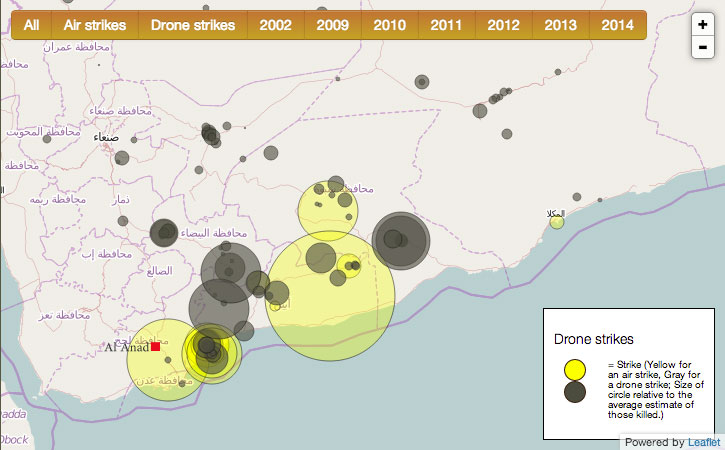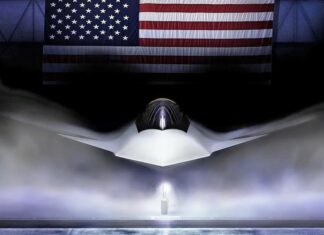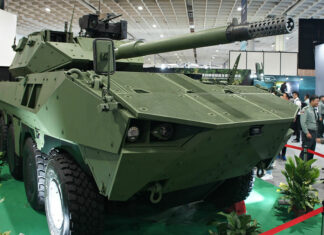A large number of al Qaeda in the Arab Peninsula (AQAP) militants were killed when a series of air strikes has hit their training camp in a remote mountainous region of southern Yemen on Saturday and Sunday, April 19-20, 2014 – the Yemeni defense ministry said. AQAP has been regarded by Washington as the jihadist network’s most dangerous affiliate. The attacks are likely targeting Al Qaeda number two Nasir al-Wuhayshi, deliberately exposed in a recent video taken at a large gathering of terrorists in Southern Yemen. Yemeni sources claimed that the follow-on strike on the 20th was not carried out by foreign drones, but by Yemeni Air Force MiG-29 fighter jets. Casualties count from recent strikes has increased to 65.
The operation targeting al Qaeda in the Arabian Peninsula is under way in Abyan and Shabwa, Yemen, a high-level Yemeni government official who is being briefed on the strikes told CNN on Monday (see video below). The Yemeni official described the attacks as “massive and unprecedented”, confirming at least 30 militants have been killed. The operation involved Yemeni commandos who are now “going after high-level AQAP targets,” the official said.
According to unofficial reports the April 20 attack comprised at least three separate strikes that were directed at a terrorist training camp in al-Mahfad, killing up to 25. On the 19 April attack ten AQAP personnel and three civilians were also killed on another drone attack; intelligence report said they were planning attacks on civil and military targets in al-Bayda province, in southern Yemen.

Drone attacks in Yemen have killed about 40 people in Yemen since January 2014. While US drone activity in Yemen can be dated back to 2002, the attacks have been intensified since 2012, as the CIA increased its pressure on the Yemen-based AQAP. Yemen is among a handful of countries where the United States acknowledges using drones, but it does not comment on the practice. The CIA is believed to be operating drones from two main bases in the area, the Yemeni military air base at Al Anad, in Southern Yemen and the Saudi border guard airbase at Um El Melh guarding the southern border of the desert kingdom’s ’empty quarter’ – Rub al Khali. This base is belived to have been operational since 2013. While aerial images of Al Anad do not indicate special facilities for drones, images from Um El-Melh show massive buildup of ground facilities for a base that can operate numerous drones of various sizes.

The drone campaign in Yemen is managed by the US Central Intelligence Agency (CIA) since 2002. The momentum of this campaign increased since 2011, particularly as the Obama administration began using drones to support the Yemeni government’s battles against al-Qaeda-linked militants in 2012. Without ‘boots on the ground’, this campaign suffered relatively high rate of ‘collateral damage’ (unintended civilian casualties) but this ration has dropped significantly in recent years (except in 2012 when 11 civilians were killed on their way to a wedding).
AQAP has also directed its attacks on civilian and military targets of the Yemeni regime as well as targets thought to be related to US operatives. In a recent attack in December 2013 a car bomb exploded inside a hospital in the capital city Sana, killing 52 people. The Mujahedeen claimed the attack was directed against an operations center controlling the drones attack in the country however, the US denied there were any American victims at the site.
AQAP has been growing in Yemen despite the U.S. CIA and government efforts to rout the terrorist groups from the country. In February 2014 AQAP conducted a suicide attack on the central prison in the Yemeni capital of Sana’a. The attack involved suicide bombers and an assault team that penetrated the facility and freed 29 prisoners, among them 19 AQAP operatives, the Long War Journal reported.
The terrorists freed during the February raid were greeted by al-Qaeda’s number two in command, Nasir al-Wuhayshi, appearing in a video aired recently on Youtube. The 15-minute video, posted on YouTube by the Terrorism Research and Analysis Consortium (TRAC).

















